Concerns over safety, accessibility plague Wheeling exempted camp
People experiencing homelessness and service providers express their concerns at a city-built camp miles away from agencies.
Wheeling, W.Va. – Locked gates, no trespassing signs, emergency medical response times, accessibility, and safety – these are the issues voiced by residents and service providers concerning the City of Wheeling’s new homeless camp exempted from the ban on urban camping.
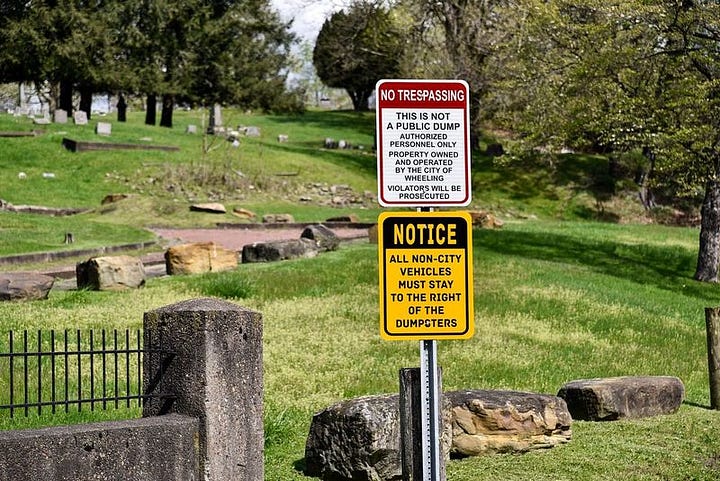
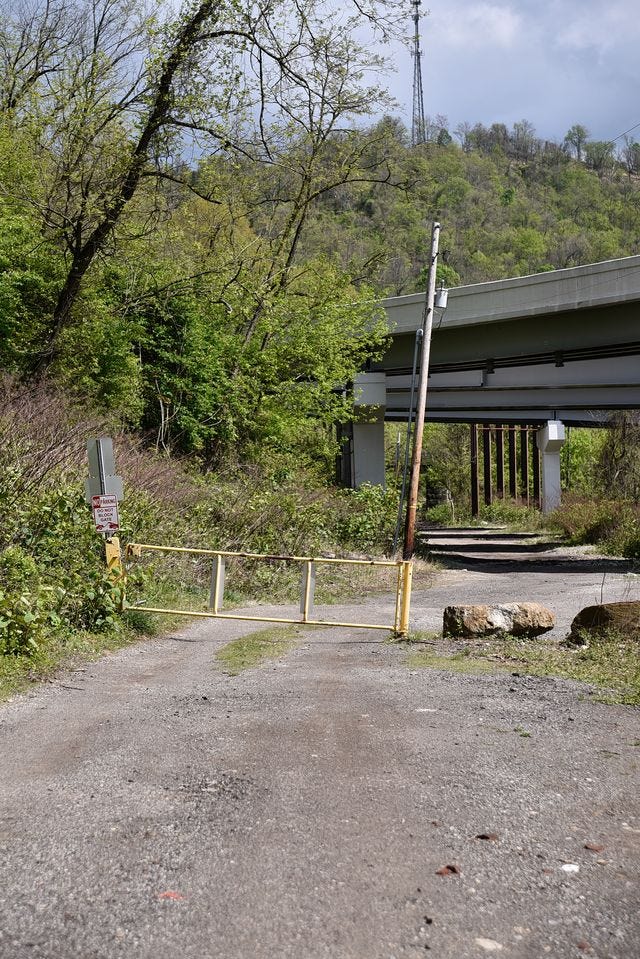
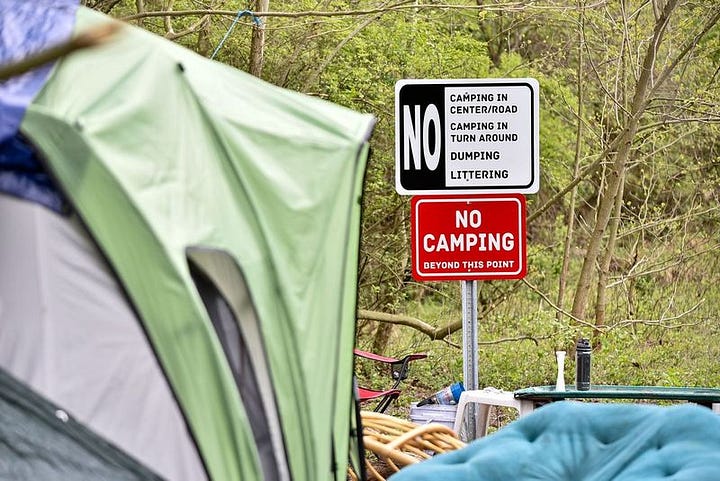
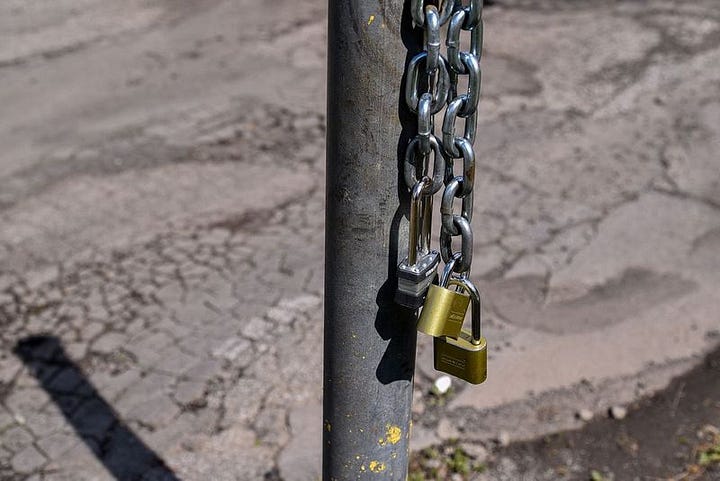
In early April, the camp opened to people experiencing homelessness. City officials congratulated themselves on a job well done, but for the people it is supposed to serve, there are questions and doubts about the new site.
Organizations devoted to caring for the homeless population estimate some 250 people are chronically or situationally homeless in the Wheeling area. There are only 95 shelter beds in the city offered between three organizations. Of those beds, most require an ID, and people with domestic violence or assault charges, and people on the sex-offender registry, are precluded from the shelters. None of the shelters allow pets or couples.
First, let us discuss how this site came to be.
Throughout 2023, the City of Wheeling began dismantling small camps where people experiencing homelessness had stayed. As residents were being displaced, the city’s homeless liaison, Melissa Adams, advised people to relocate to a hillside in East Wheeling behind the Nelson Jordan Center saying their camps would be safe there.
At its peak, the East Wheeling camp was home to some three dozen individuals.
In October 2023, the city broke its guarantees when it posted eviction notices along this hillside. Service providers, activists, and concerned citizens pushed the city to hold off on clearing the camps. The city acquiesced, but simultaneously began discussing a ban on urban camping copy-and-pasted from the City of Parkersburg.
On November 7, 2023, the city adopted an ordinance banning sleeping, storing personal belongings, and cooking for habitation purposes on public property by a vote of 5-2. In that ban, city councilors unanimously adopted ordinances reducing the lower threshold of fines to ten dollars, with community service as an alternative penalty.
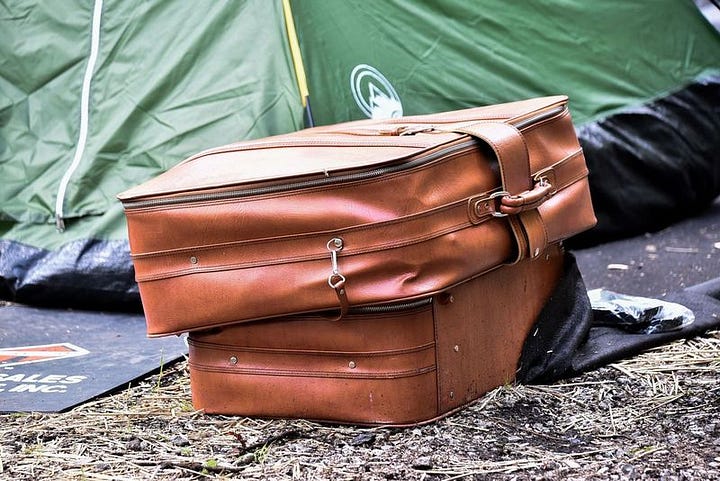
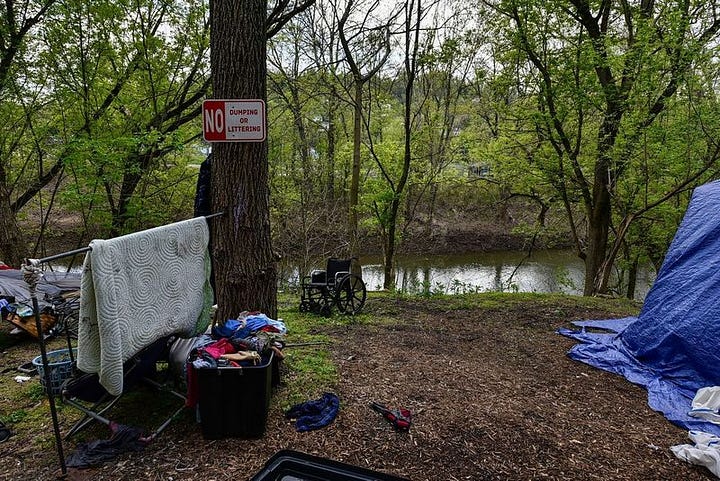
Another amendment empowered the city manager, Robert Herron, who holds executive power in the City of Wheeling, to exempt camps from being penalized under the ban.
No process for requesting an exemption exists in the ordinance. And there is no language related to a ‘managed camp’ despite media and city elected officials reporting the same.
On January 17, 2024, the American Civil Liberties Union of West Virginia sued the city requesting injunctive relief against the ban. However, on January 18, the city, at the direction of Herron, ordered the East Wheeling hillside be vacated, demolished, and destroyed.
The ACLU of WV entered into negotiations with the City of Wheeling to halt further demolition activities. The agreement saw a camp erected in a parking lot under the U.S. 250 / W. Va. Route 2 overpass on 18th Street – the same site that homeless people occupied in 2021, but was cleared by the city and laid the groundwork for a landmark federal case outlining guidelines for the city to follow when it chooses to demolish a camp.
In March 2024, the West Virginia Division of Highways, who owns the parking lot under U.S. 250 and leased it to Ohio County, terminated its lease citing a violation of the agreement. Although the division planned to vacate the camp by March 15, the city was given a month’s extension.
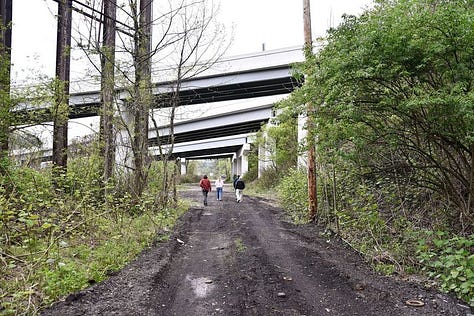
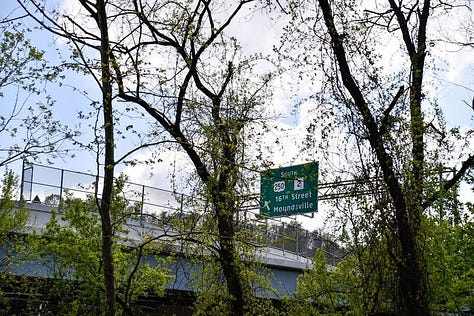
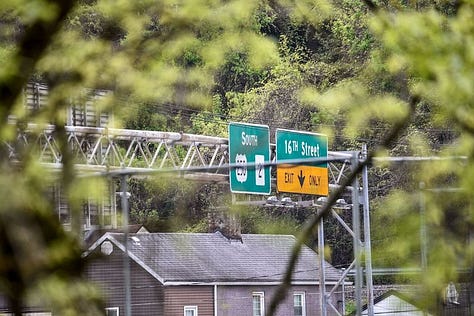
The City of Wheeling responded to the Division of Highways’ eviction notice by setting up a new, exempted camp for homeless residents. Located northeast of the Fitzsimmon’s Dog Park in East Wheeling, the campsite sits between a hillside and Wheeling Creek along a newly-created maintenance road. It stretches roughly 200 feet and has capacity for 25 tents.
The city’s Operations Department worked to widen a trail through overgrowth into an access road large enough to accommodate ambulances and police cars and service agency vehicles.
The city also provided the camp with one dumpster and two portable toilets. There is no access to water on site, and the camp is lit by solar-powered lights provided by an employee of Catholic Charities.
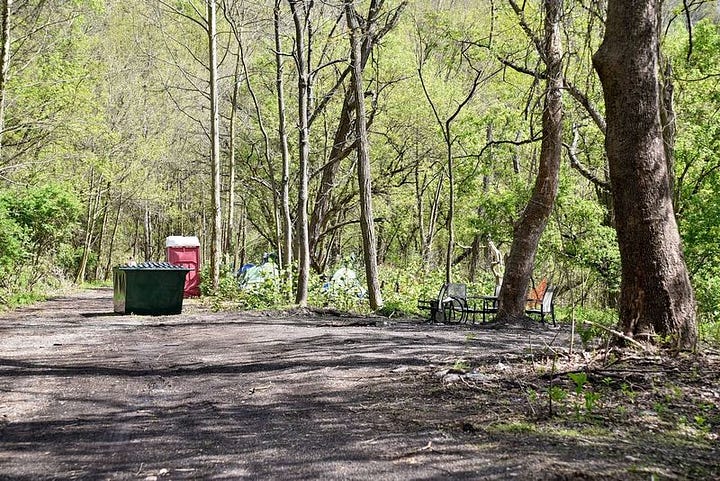
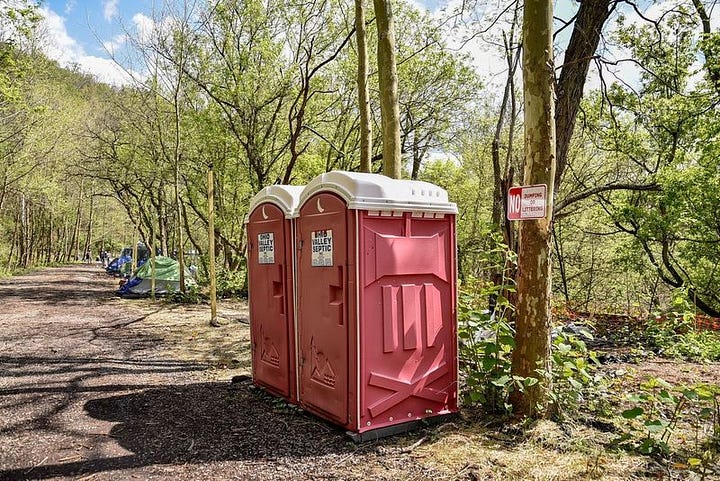
Now, the camp has been left to organizations like Street MOMs, the Greater Wheeling Coalition for the Homeless, the Catholic Charities Neighborhood Center, and others to maintain.
Issues quickly became apparent after homeless residents were moved to the site.
Wheeling was hit with back-to-back floods–the worst in nearly 20 years. Although the creek stayed within its banks, the combination of a month’s worth of rain over a couple days and runoff from the hillside adjacent to the camp flooded tents. Service providers supplied pallets to the camp to raise tents off the soggy ground, but the damage had been done. Several individuals saw their belongings destroyed.
The camp itself is locked behind two gates with several “No Trespassing” signs flanking the trail. And the service providers, like Street MOMs, who are tasked with moving people to the camp and providing other services, have no key to open the gates.
Lynn Kettler and Susan Brossman operate Street MOMs. They took this reporter to the exempted camp on Wednesday, April 23, where the gate leading into the camp, approximately 1600 feet away, was locked.
“The gates have been closed all day today,” Kettler said. “It’s been closed every day this week.”
The city’s homeless liaison, Melissa Adams, should be the person for service providers to contact when they need into the camps, but she has allegedly been on leave for several weeks.
And this lack of access for people like Street MOMs is a big deal when they’re attempting to relocate someone to the camp. Brossman recalled a time when they had filled their transit van with the belongings of two homeless residents, but she couldn’t access the site.
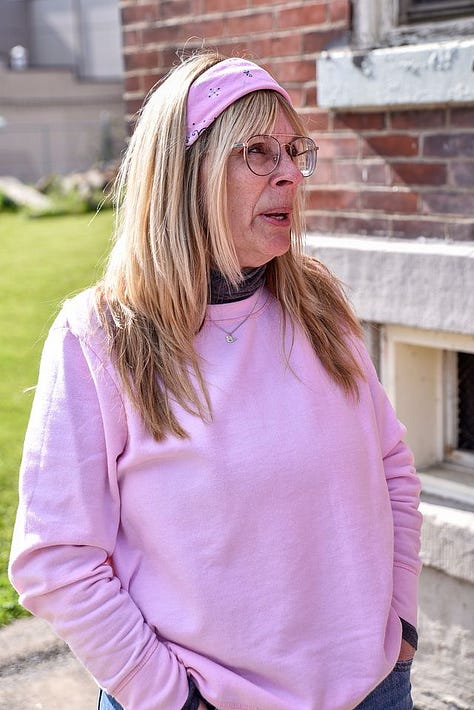
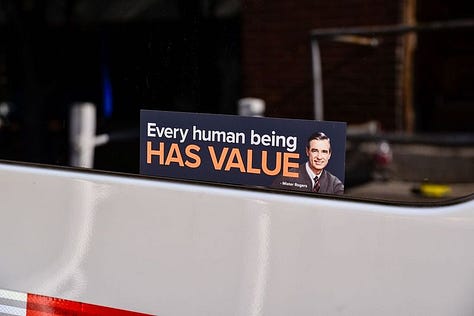
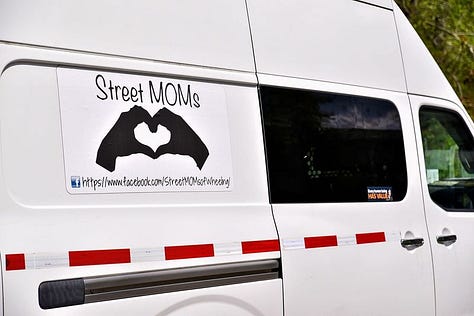
“We were stopped [for] 45 minutes to an hour because we were locked out. We couldn’t get somebody to let us in,” Brossman said.
Another glaring issue for the new exempted camp for homeless residents is accessibility.
The road to the camp is not paved, so it can quickly become muddy. Any person reliant on a wheelchair, or otherwise physically impaired, would have a difficult time living at the camp. And the camp itself is, at minimum, a mile away from access to services like food, water, electricity, and showers.
The city-approved path from the camps to services–which are predominantly in East Wheeling along 18th Street–sees residents walk an estimated 1.63 miles, or about 40 minutes one way, to the Catholic Charities Neighborhood Center.
People can walk an alternative route along Rock Point Road and 20th Street, but this passes through private property and is blocked by man-made walls built from sticks and logs.
A third, and somewhat shorter, route would see residents scale a large stone wall onto the Heritage Trail at Tunnel Green and walk just over a mile to the Catholic Charities Neighborhood Center. Not only is this way dangerous, as the stone wall easily becomes slippery, but the trail itself closes from dusk to dawn, meaning those caught using it after hours could be fined or otherwise criminally cited.
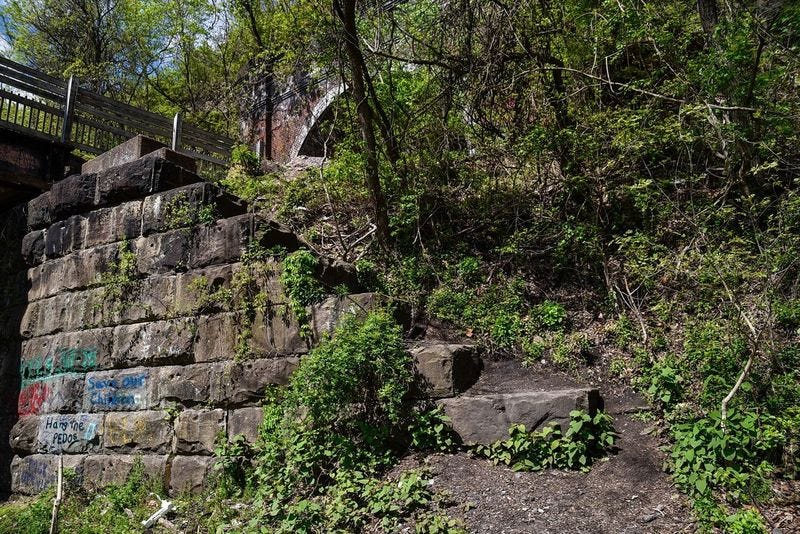
The distance from services and the quality of the maintenance road have led to fears that emergency medical response times could be affected. However, the city’s Fire Chief, Jim Blazier, and EMS Coordinator, Jason Milton, say their personnel have been trained to respond to the site.
Milton said his staff took drone shots of the camp and provided PDFs for first responders to reference. “I didn’t want anything left to chance as far as finding this place,” Milton said.
On April 15, 911 dispatch received its first call from the camp. A man overdosed early in the morning and a woman provided him NARCAN and CPR. When first responders arrived, the gate leading to the camp was locked, but Milton says that didn’t slow them down.
“It’s a combination lock,” Milton said. “That combination is known by all the city employees–police, fire, operations I would assume.”
The city’s fire department was notified at 8:38 a.m. of the overdose and were on scene by 8:43 a.m. Three minutes later, at 8:46 a.m., paramedics were with the patient who was responsive and alert at the time first responders arrived.
Milton did, however, say the fire department has talked about concerns of accessing the camp. When asked if paramedics had to leave their ambulance and walk to the patient–an allegation told to this reporter–Milton said he could not confirm or deny it.
“They probably had to traverse some of it by foot, but that’s just–sorry to say–the nature of that out there. It’s not something we want to do, obviously, but…if we dump an ambulance over a hill or…get it stuck we’re not helping anybody by doing that,” Milton said of the trail’s access.
There is a turnaround as you enter the camp, but this is at least a hundred feet away from the tents. Ambulances would need to reverse in or out to navigate the tight space, or respond on foot. Another option would be to utilize the fire department’s ATV, something Milton has considered.
Ohio County prides itself with quick response times–on average five minutes from dispatch to the scene. Other counties in the state can see response time as long as 55 minutes.
Physical safety is another concern about the new exempted camp. Brossman told this reporter that assault is a big issue as the camp is far flung and away from the eyes of the city at large.
“It’s dangerous,” Brossman said. “Things change after dark.”
“All, with a capital A-L-L, all of our women have been injured in some form or another,” Brossman said. “If things happen in the middle of the night, there’s not an emergency place for them to go where they can be safe.”
In response to the list of problems at the exempted site, Catholic Charities Neighborhood Center set up a camp of their own catering particularly for women and people with disabilities.
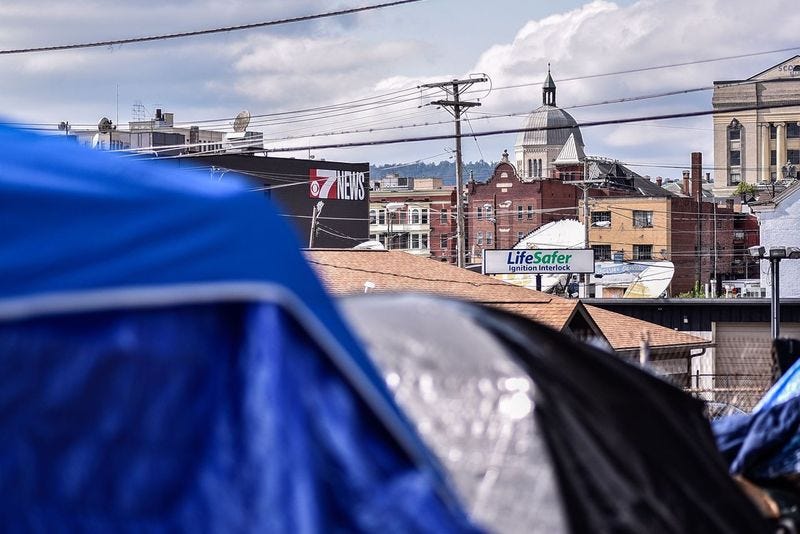
During the day, anywhere from ten to fifteen people stay at their camp on 18th Street. At night, those numbers increase as some homeless people fear the walk back to the exempted camp. The Catholic Charities camp is small, measuring roughly 20 feet wide by 100 feet long.
Mark Phillips, President and CEO of Catholic Charities West Virginia, spoke to this reporter about the private camp operated by his organization’s Wheeling location, as well as his concerns about the exempted camp.
“Having the exempted location, the distance to the neighborhood center, right now [it is] difficult for people with mobility issues to get back and forth,” Phillips said. “So those [staying at the Catholic Charities camp] are people with long-term disabilities. It may also be somebody that’s having a shorter-term health crisis.”
Speaking about the women who stay at the camp, Phillips said there were a number of victims of physical and sexual assault who do not feel comfortable staying at the same location as their attackers.
Phillips said it would be beneficial if the exempted camp has more space.
“We also know that there are some individuals that opted not to come to [the exempted camp] because of previous conflicts with some other individuals,” Phillips said. “In terms of its space, I don’t think it’s totally adequate to serve the need.”
The same concerns as discussed above were brought up by Phillips, too. Locked gates, the distance from services, access to food and water, no trespassing signs, accessibility, and more.
When asked if he would describe the exempted camp as a safe location, Phillips said, plainly, “No.”
“All you’re doing is rounding up individuals and telling them where they can be. You’re offering no access to life-sustaining services, you’re offering no support, you’re offering no pathways to healthier lives or to housing,” Phillips said.
“I find it hard to describe anything the [the city] is doing with kind terms.”
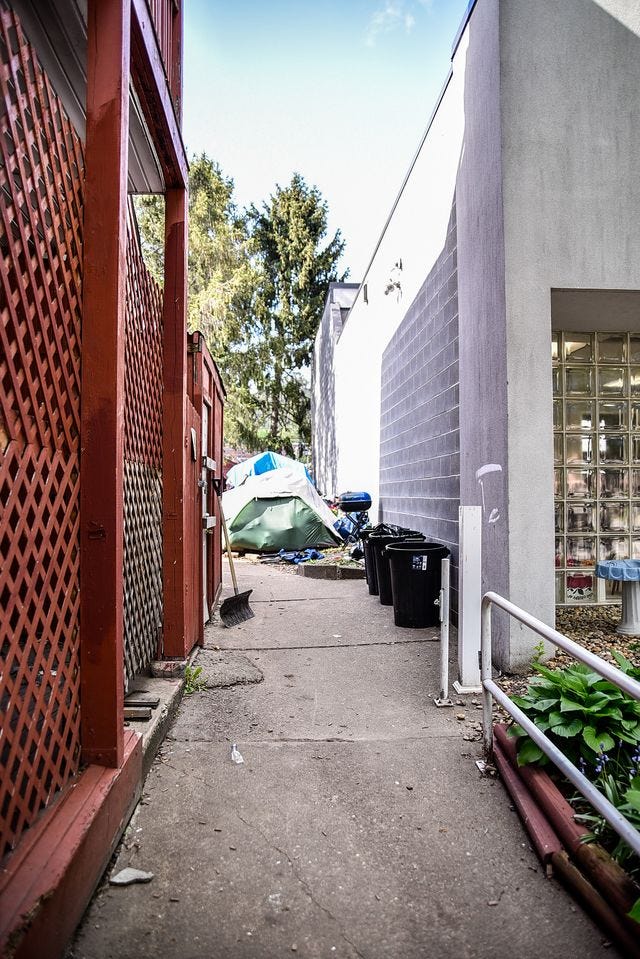

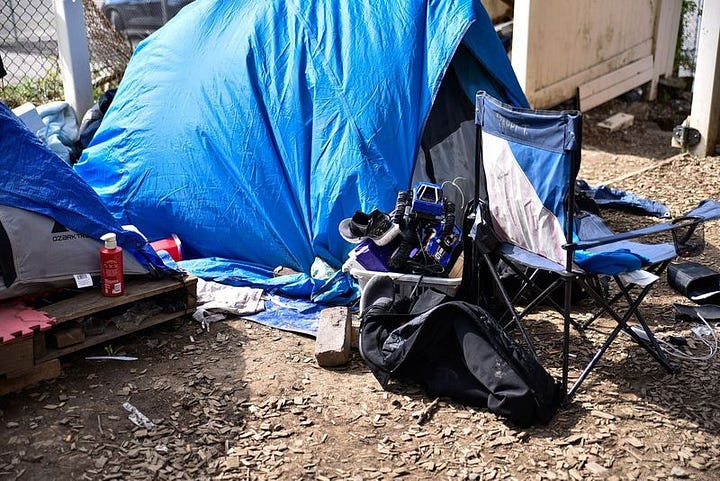
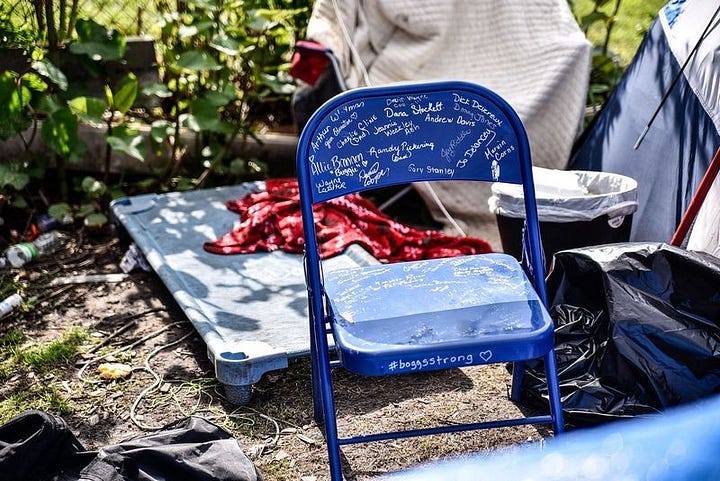
Phillips said no one camp is a solution; rather, he says it’s evidence of a problem. Many in the homeless community have experienced a lifetime of trauma, mental health issues, and drug addiction.
“So when you have a population like that and the city’s solution is to round up folks in one place and provide no resources for them to live happier and healthier lives, to me, it’s simply uncaring, and it’s giving up,” Phillips said. “It’s not a real effort to combat the issue.”
Phillips was clear in saying city manager Robert Herron has been responsive to concerns from Catholic Charities, and has worked with his organization throughout this process.
Herron’s office lobbied the W. Va. Division of Highways to extend the deadline to vacate the U.S. 250 camp. And, after the floods in early April, Herron again asked for more time. Both requests were granted.
Herron has toured the exempted campsite, but this reporter was told this occurred before residents moved in. It is unclear if any elected official in the city–those who voted for the urban camping ban or otherwise–have toured the exempted camp or the Catholic Charities camp.
The city manager’s office was sent two requests for comments on this story. At the time of publication neither of those requests have received a response.
When Wheeling Free Press visited the camps on April 23, our goal was to speak with people most impacted by the camps–those experiencing homelessness. While no member of the exempted camp wished to be interviewed or photographed, several people at the Catholic Charities camp did.
Roberta is originally from Martins Ferry, Ohio, but moved to Wheeling with a partner. She has been homeless for four to five years. “I’ve stayed with my friends, but then two and half years ago I lost my mom,” Roberta said. “So, from then I’ve been out here.”
Asked if she felt safe at the Catholic Charities camp, Roberta said sometimes. She said she has no plans to live at the exempted camp.
“It’s hard being homeless out here. You’ve got to basically prove yourself,” Roberta said. “Let alone being homeless and a female. You've got a lot to prove.”
When asked if she had a comment for city officials, Roberta smirked and declined to speak. However, she did say it felt like the city was not doing much for them.
“They don’t want us to be seen or heard or anything like that,” Roberta said. “[The city] needs to learn. They need to sit down and actually get to talking to us and get to know our story, not just automatically judge us.”
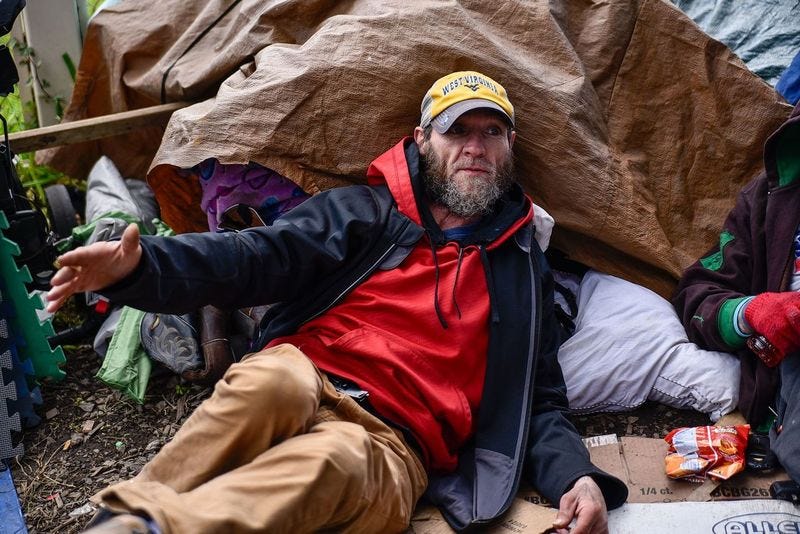
Another man, T, said he felt like “cattle” being moved around the city.
“It was perfectly okay to be under [the U.S. 250 overpass]. Then they move us all out and we all go up on the hill. Then they don’t want us on the hill so now we’re back underneath the [U.S. 250 overpass]. Then all of a sudden we’re not allowed over there,” T said, recounting his recent moves.
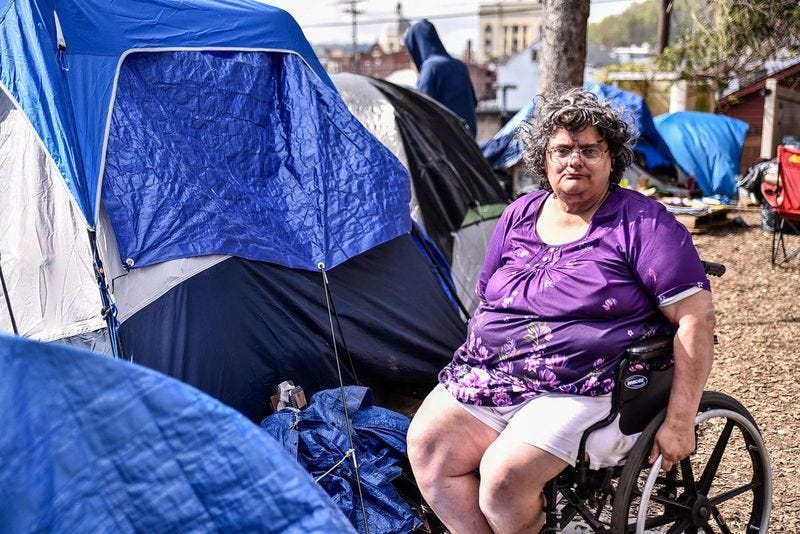
Millie, who stays at the Catholic Charities camp, and her adult son, Joseph, who stays with a friend, spoke to this reporter at length. She reports having Parkinson’s disease and she partially relies on the use of a wheelchair to aide in her mobility.
On February 15, 2024, Millie says she became homeless. “I’m pretty new to this,” she said.
Millie says she was living with her older son and his family. However, when her son moved away, she discovered that the house’s utility bills were behind. Her electricity was shut off, her water lines were frozen, and a city inspector cited them for using kerosene heaters in the home–something that is prohibited under W. Va. Code R. §87-1-4.
When asked what it was like to be homeless, Millie said, “Scary.”
She talked about friends who showed her how to create a makeshift heat source for warmth. Millie recalled a time when the heater fell over nearly causing a fire. Speaking about the close call, Mille said, “It scared the bejesus out of me.”
Millie says Parkinson’s disease causes her to shake and fall, and has led to early stages of dementia. She could not stay at the exempted camp, even if she wanted to.
And Millie does not want to go to a shelter, as it would mean relinquishing her beloved Bruiser, a handsome chocolate lab and pitbull mixed breed.
“Someone like me that has a dog, we have to turn our dogs over to the pound to be able to go to a shelter,” Millie said. “There is no shelters for people with dogs or cats.”
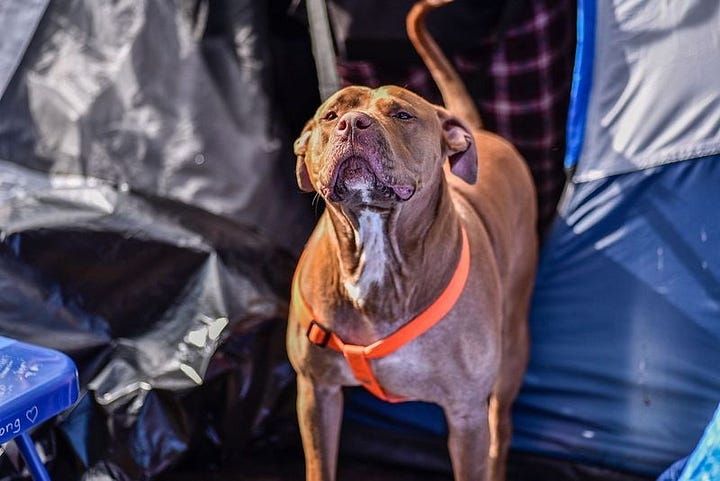
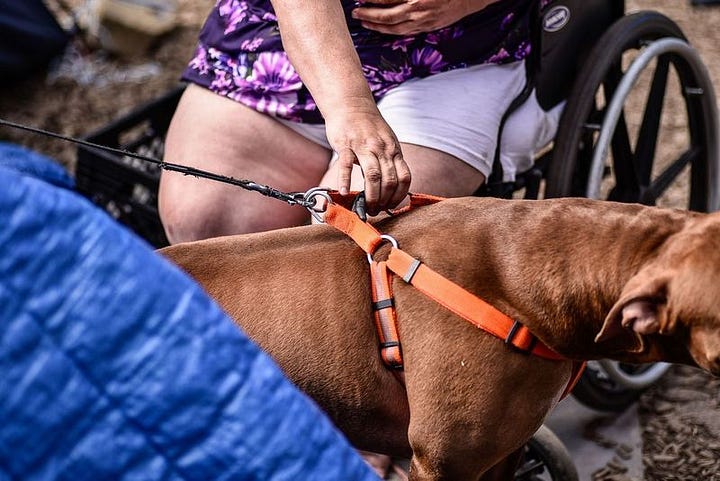
Millie says Bruiser is a certified medical dog. This reporter cannot confirm or deny that.
“He has saved my life too many times. And during times that [Joseph] was gone, [Bruiser] is the only one that has been there for me through thick and thin since the day I got him,” Millie said.
“He lets me know when the tremors are going to start,” Millie said. “He lets me know when my sugar is going up or down, or when my breathing messes up he will grab the inhaler.”
Asked if she felt safe at the camp, Millie said she did during the day.
“I won’t come out of my tent at night,” Millie said. She says more people stay there at night, and the fighting and drug use scares her.
Millie had a few comments for city officials. “Look at all your abandoned buildings you’ve got in this city,” she said. “All these old schools, all these old factories. The money you guys spend every year moving [homeless people] back and forth, you could redo one of those buildings.”
“Homelessness is not contagious,” Millie said as she recounted feeling ignored by people who are housed. “You could end up here just as quickly as I did. It don’t take much. And there’s only supposed to be one judge and it’s not you.”
Service providers like Catholic Charities, Street MOMs, the House of Hagar, Trash Talkers, the Greater Wheeling Coalition for the Homeless, and The Soup Kitchen of Greater Wheeling, among others, are tasked with maintaining the camps and providing for their residents.
It is a huge financial responsibility to bear, especially for the small non-profits like Street MOMs and the House of Hagar. If you want to support the work that they do, please consider reaching out to these organizations and offering donations.


Justice, I am just so grateful to you for keeping us informed this past year or so. Thanks so much for telling these stories.